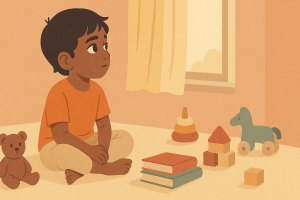How to Turn Your Child’s ‘Why’ Questions into a Love for Learning
If you’ve ever been caught off guard by your child’s endless ‘Why’ questions, you’re not alone. ‘Why is the sky blue?’, ‘Why do birds fly?’, ‘Why can’t I eat ice cream for breakfast?’ While it can sometimes feel overwhelming, these questions are more than just curiosity – they’re a window into your child’s developing mind.
Here’s the good news: those ‘Why’ moments can become some of the most powerful opportunities to spark a lifelong love for learning in your child. Let’s talk about how you can embrace this phase and turn it into something magical for both of you.
Why Do Kids Ask So Many Questions?
First, let’s take a step back and think about why kids ask ‘Why’ so much. It’s simple: they’re little scientists, constantly observing, experimenting, and trying to understand the world around them.
So, instead of feeling overwhelmed (easier said than done, I know), think of every question as a chance to help their brain grow and their curiosity flourish.

How to Turn ‘Why’ into a Learning Adventure
Now, let’s get practical. Here are some ways you can turn those endless ‘Why’ questions into opportunities to teach, connect, and inspire.
1. Welcome Every Question (Yes, Even the Repetitive Ones)
It’s tempting to dismiss the 20th question of the day, but try to embrace it instead. When they ask, ‘Why does the sun shine?’ you can say, ‘That’s a great question! Let’s find out.’
This shows them that their curiosity matters, even when the questions seem small or repetitive.

2. Ask Them What They Think First
Next time they ask you ‘Why?’, flip the question back to them. Say something like, ‘Hmm, why do you think that happens?’
You’ll be surprised by how creative their answers can be! Plus, it gets them thinking critically instead of just waiting for your reply.

3. Turn It into a Story
Kids love stories, so why not turn your answers into one? For example, if they ask, ‘Why do trees lose their leaves?’ you could say, ‘The trees are getting ready to sleep for the winter, just like we wear pajamas before bed.’
This makes learning fun and easier for them to remember.

4. Do Hands-On Activities Together
Sometimes, the best way to answer a question is by showing them. Curious about how plants grow? Plant a seed together and watch it sprout. Wondering why ice melts? Do a quick experiment with an ice cube in a sunny spot.
These activities bring their questions to life and make the answers unforgettable.

5. Embrace ‘I Don’t Know’ Moments
It’s totally fine to admit when you don’t know something. In fact, it’s a great opportunity to show your child that learning never stops. You can say, ‘I’m not sure, but let’s look it up together!’
This teaches them that not knowing isn’t a dead end – it’s the beginning of discovery.

And if you’re following a specific parenting approach, like positive or gentle parenting, you’re already creating a supportive environment that encourages curiosity.
Want to take it a step further? Parenting courses and resources about child brain development can give you even more tools to nurture their love for learning.
A Quick Tip for Busy Parents
Let’s be honest – life gets hectic, and you can’t always drop everything to answer every question. That’s okay!
Try this: Keep a little ‘Why Notebook’ where you jot down your child’s questions throughout the day. Later, when you have time, pick one or two to explore together. It’s a simple way to show them their questions matter without feeling overwhelmed in the moment.

Why This Phase Matters for Mental Health
Encouraging curiosity doesn’t just help with learning – it also supports your child’s mental health. A curious child is more likely to approach challenges with an open mind and problem-solving attitude.
Plus, when you engage with their questions, you’re teaching them that it’s okay to be curious, make mistakes, and keep exploring. These lessons can build resilience and confidence for life.
Final Thoughts: Nurture Their Inner Explorer
So, the next time your child asks, ‘Why?’, take a deep breath and remember: This isn’t just a question. It’s an opportunity to teach, connect, and inspire.
Who knows? That one little question could spark a lifelong love for learning.
Here’s your next step: Grab a notebook and start writing down your child’s questions this week. Pick one to explore together, whether it’s through a story, a hands-on activity, or a quick online search.
For more parenting tips and ideas, check out parentingveda.com. Let’s make this journey of learning a fun and memorable one – for both you and your child.
Disclaimer: This blog is correct as per the writer’s knowledge. This is not medical guidance. Follow as you are responsible for.







